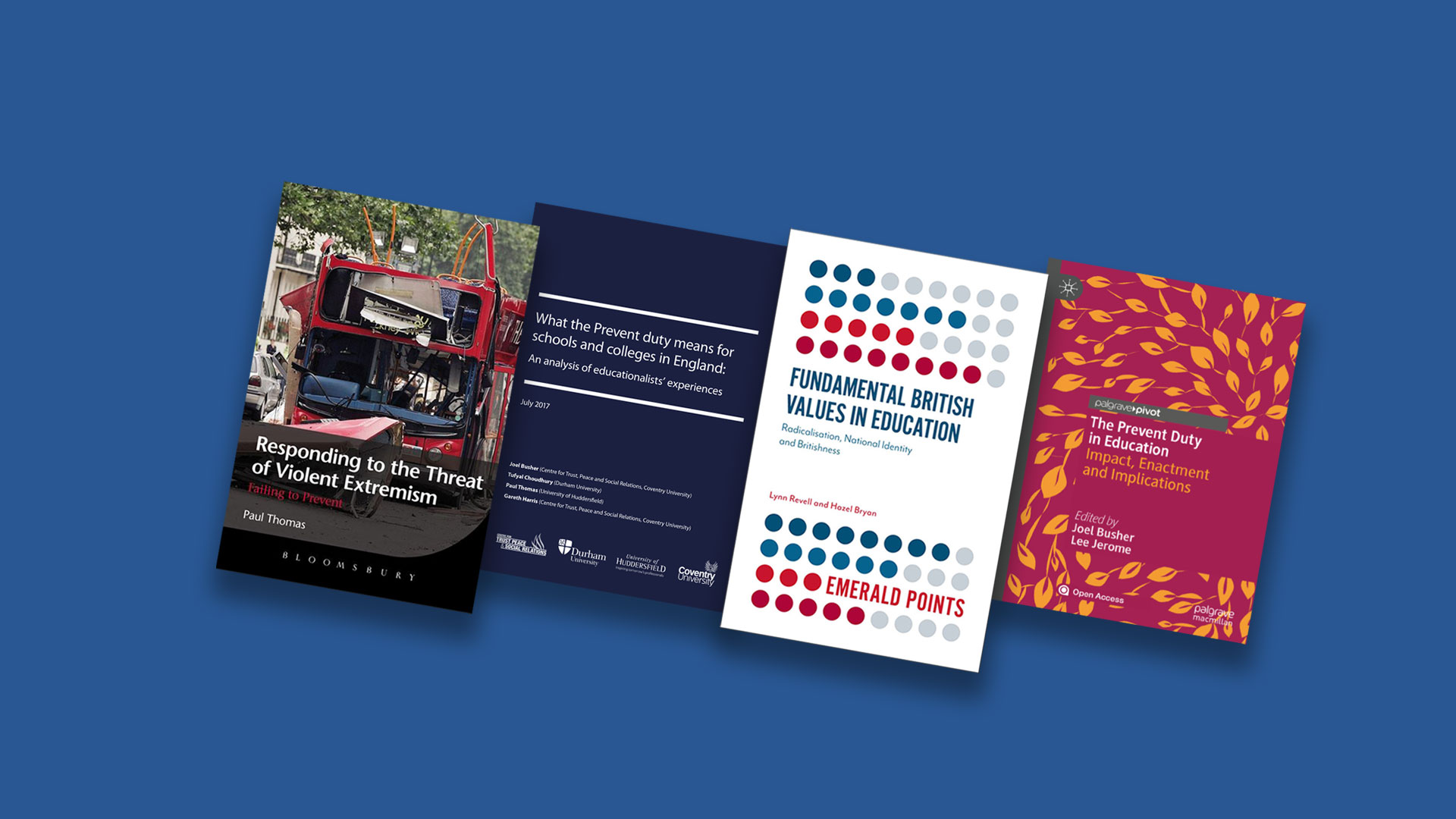
HudCRES Seminar: Education and Extremism
On the 18th November, Professor Hazel Bryan, Dean of the School of Education and Professional Development and Professor Paul Thomas, Associate Dean (Research), delivered an online seminar about their research focused on the Prevent Strategy and Fundamental British Values in English schools.
An edited recording of this event is available to watch below, followed by responses to some of the many interesting questions that were posed during it, only some of which could be addressed at the time.
Education and extremism: English Schools on the frontline of the Prevent Strategy
18 November, 2020
Questions and Answers
How many people in your research and experience are actually teaching Prevent and Channel - in schools, colleges, universities? Are colleagues getting the diversity and awareness training through CPD to do this?
Schools and colleges have to uphold and teach about ‘British values’, as part of the Prevent duty requirement. Our research (Busher et al, 2017; 2019) found that educators are doing this through work around citizenship, equality and tolerance across both their curriculum subjects and in additional inputs via assemblies, ‘drop down’ days and extra-curricular activities. More training and curriculum material support for this work would help educators, particularly in in supporting ‘difficult conversations’ with students about contentious issues.
When implementing Prevent, how did teachers understand the terms 'extremism' and 'radicalisation' given these are rather nebulous terms (and in relation to radicalisation, the Government's Prevent Duty doesn't have a single definition)
Our research showed that teachers did not foreground the precise meaning of radicalisation, rather they saw it as a real and existing type of vulnerability and so a legitimate part of their safeguarding role. Defining ‘extremism’ is particularly difficult. Certainly, educational researcher Professor Lynn Davies identifies the need for more ‘extreme’ ideas to be aired and discussed within classrooms to enable a student engagement with complexity of ideas and identities. The Commission for Countering Extremism prefers to focus on ‘hateful extremism’ as a more precise social harm, than a vague ‘extremism’.
Can we take at face value the educators’ story that Prevent is all about caring for and safeguarding our students - we know that Prevent has alienated many and is implicated in a system that is systematically unequal?
Empirical research from across the educational sector in recent years has shown that teachers in schools and colleges accept the ‘Prevent as safeguarding’ approach. Our own research clearly showed that teachers’ primary concern was for the individual student’s welfare, and then about what harm the student may then go on to do – that perspective is one of safeguarding.
How aware are the students themselves of the Prevent responsibilities (do educators make this duty explicit)?
It’s very difficult to know how aware students are of the Prevent duty and we need more research around this. Our research found some schools explicitly discussing this with students and even involving older students in planning some of the Prevent curriculum work. In terms of Prevent as safeguarding, students may not be fully aware, just as they are not necessarily aware that schools are monitoring student vulnerability towards Child Sexual Exploitation, or gang or drugs involvement. In this way, Prevent is implicit within general safeguarding against vulnerability.
Is multiculturalism Dead?
Some politicians, such as David Cameron, believe that multiculturalism has failed because people have been encouraged to live separate lives and do not share a vision for society (Munich Security Conference, 2011). The German Chancellor Angela Merkell shares this view, expressing her concern about people ‘living side by side’. Researchers too have expressed concerns over the contribution such ‘separateness’ may have made to a lack of a shared identity (Pfalzgraff, 2017). And yet, in more recent research undertaken by Professor Paul Thomas, Dr Shamim Miah and Professor Pete Sanderson at the University of Huddersfield into ‘Race, Space and Multiculturalism in Northern England’ (2020) a far more nuanced picture emerges, where good ethnic relations and positive inter-community activity along the M62 corridor can be found alongside areas of tension.
What are your thoughts around the recent instruction that schools should not use resources of any organisations that take extreme political stances?
Myriad resources have been produced to support schools in enacting their Prevent duty (by dioceses, subject associations, publishers and so on). Some argue that all such resources are in and of themselves ‘securitised’ (Lundie, 2019) and others have long argued that resources and artefacts are the micro-technologies of policy that control ‘meaning’ in the school (paraphrased from Ball, 2012). My view is that all resources should be viewed critically by teachers before being used in a teaching and learning context. This requires teachers to have a language to ‘read’ these materials critically. In this way material that promotes extreme political stances would be picked up. In the hands of an expert teacher, and in appropriate lessons, a range of political views can be discussed in an informed context, and such teachers would be skilled at doing this. But resources produced by organisations that promote extreme political views are likely to have been crafted in a highly persuasive manner, aimed at drawing in (young) people. The highly skilled teacher is absolutely essential here, to promote discussion and provide information for the young person while ensuring literature that promotes extreme political views does not fall into the hands of the young person.
I would value your view on the 'detrimental effect of 'othering ' as a result of FBV as it applies to practitioners/teachers working in early childhood education or primary education.
Our research has shown that teachers are overwhelmingly well meaning and situate the promotion of FBVs within a wider context of safeguarding - and it is the safeguarding agenda that can cause uncritical engagement with FBVs such that ‘othering’ can result. My view is that professional development would be an ideal means by which awareness could be raised and discussion take place to share rich practice that would ensure othering is firstly understood and secondly, avoided.
Do we need to move away from the FBV agenda then, or is this essentially about repackaging a values/citizenship agenda, moving away from the language of Britishness?
I think that a language to talk about ‘Britishness’ might be needed more than ever as we begin to understand what Brexit means for us all and how, for example, debates around independence for Scotland are engaged with. The backdrop of Black Lives Matter and the pandemic have made visible inequalities and inequities in Britain that need to be addressed - and I see all this as an essential discussion around what it means to live in contemporary Britain. I do think that the phrase ‘(fundamental) British values’ has been open to negative interpretation, and is insufficient to represent the rich cultural heritage of British society today – it’s been a lost opportunity to celebrate diversity as well as address inequality and inequity. I do understand the provenance of the phrase and the intentions behind it, but I wish it had been expanded to articulate an obviously inclusive vision of society. A revisiting of a values/citizenship agenda would be wise in order to respond to the issues I have raised.
What approaches are being taken in other nations' schools in response to acts of terrorism? Do they foreground values education? You mentioned that the UK approach is a unique one in that there is a legal duty.
No other country in the world has a formal legal duty to report radicalisation but, in practice, schools in other countries do this as part of their safeguarding arrangements. Interesting new research by Lasse Lindekilde and David Parker compared teacher attitudes and understandings of identifying radicalisation in England and Denmark. It shows that teachers in both countries regard this as a legitimate part of the role and that the duty has helped teachers in England to be more confident and proportionate in their enactment of this role. This suggests that we should not overplay the distinctiveness of the Prevent duty. Other countries, though, do put greater emphasis than we do on Citizenship education, and we need to make this a greater priority.
Should teacher educators encourage student teachers to follow policy and promote BVs when much research has shown there is danger of othering / chilling stigmatisation of groups. Many would claim there isn't time in ITE for challenging policy and encouraging teachers and students to be critical.
Teachers have a statutory duty to enact the Prevent duty, and because the promotion of British values is articulated in the Teachers’ Standards, we as teacher educators must ensure that our student teachers are well informed of the issues but equally able to undertake their roles - we fail in our duty to them if we do not do this. Research I undertook with Revell and Elton-Chalcraft (2018) with 150 PGCE students showed that Prevent did not always feature as part of the induction into the practicum school and whilst most schools had visible signs or symbols of Britishness, the students had less support when it came to understanding the signs of radicalisation. This suggested to us that a key role for ITE is to ensure students understand these issues and where to seek support in school should they need it.

